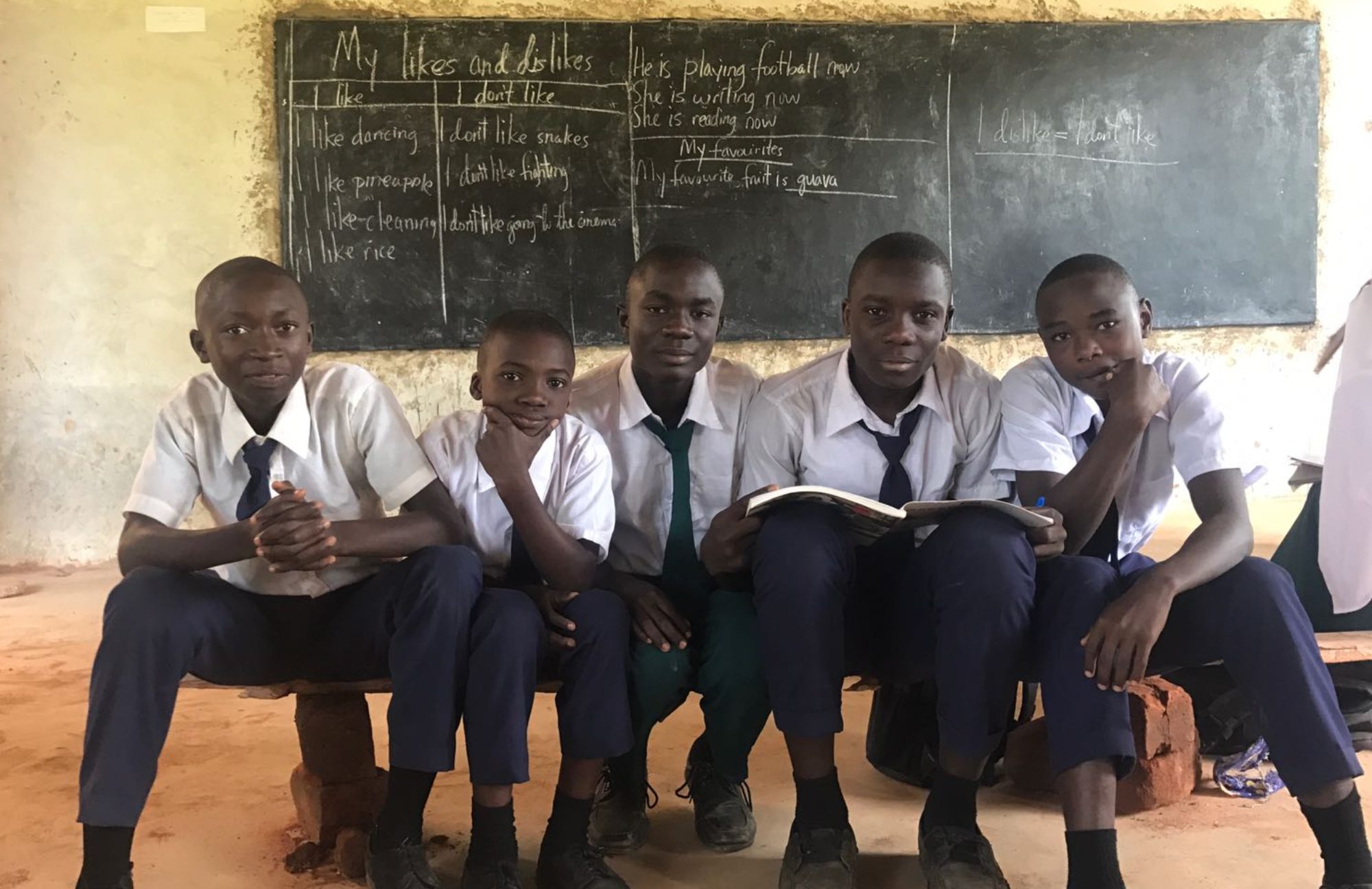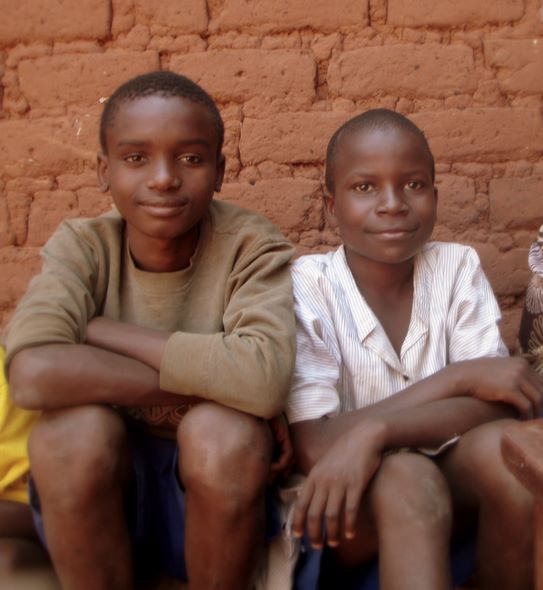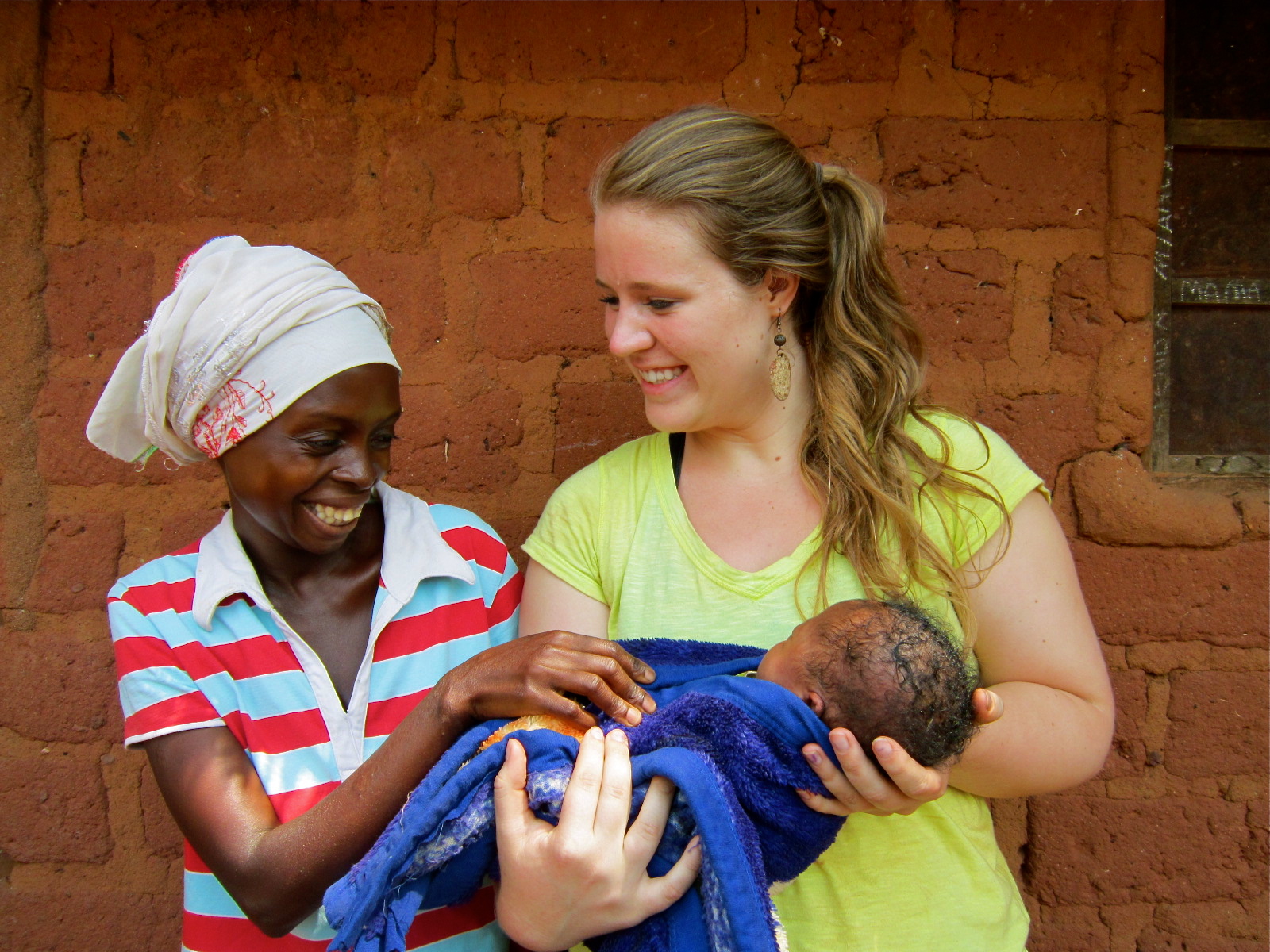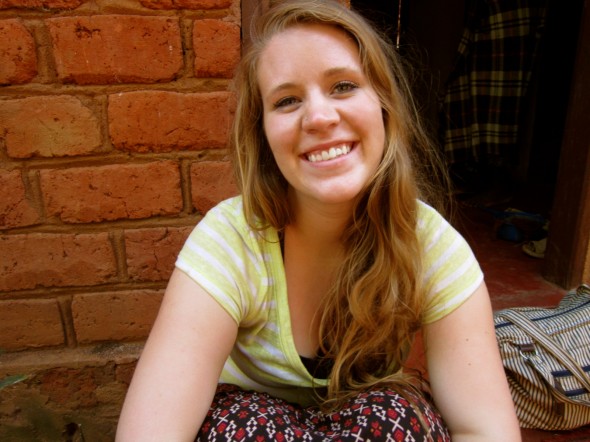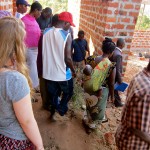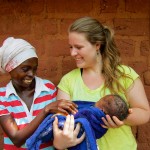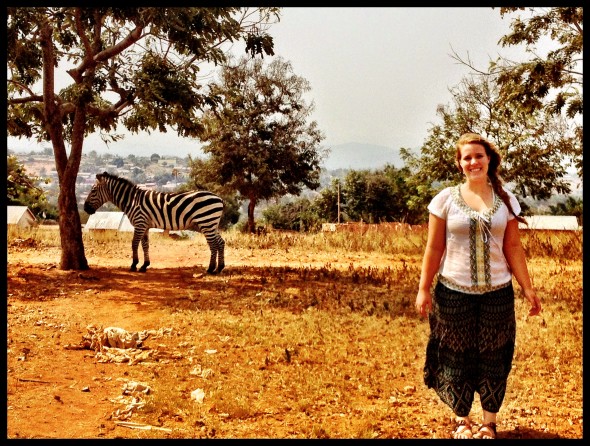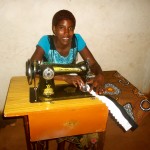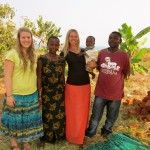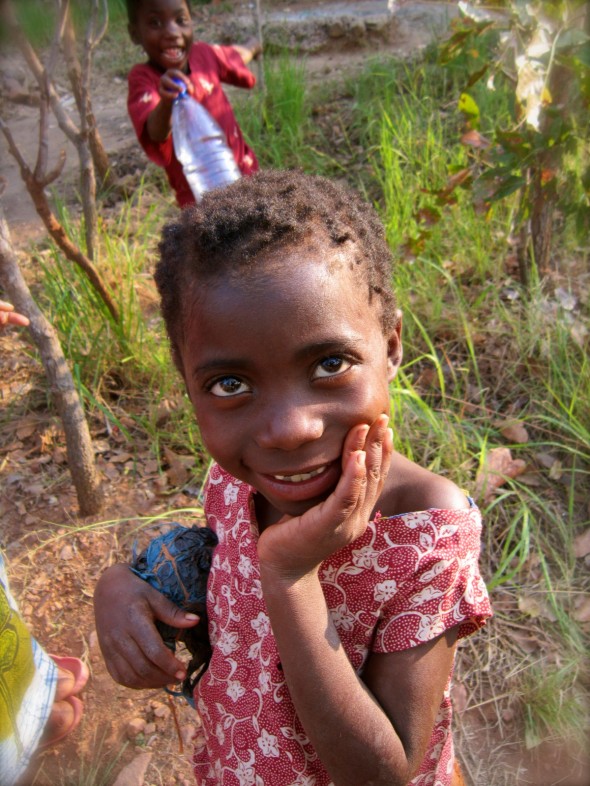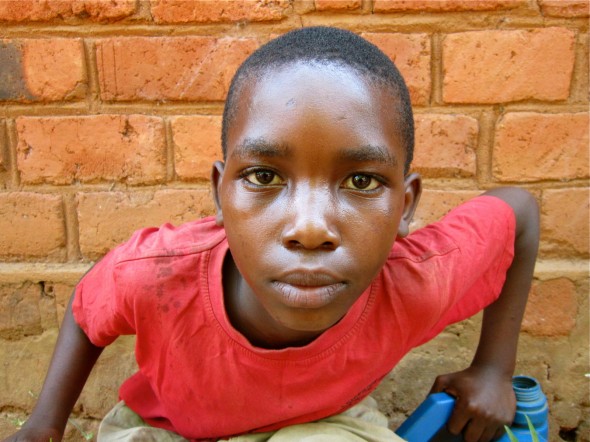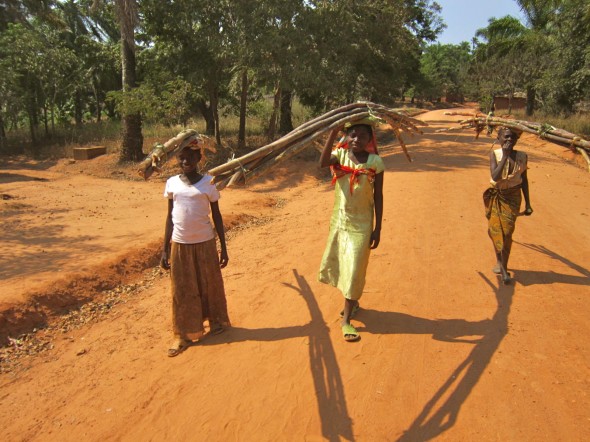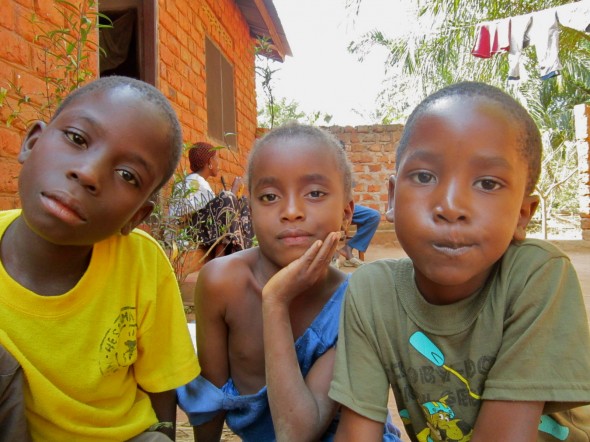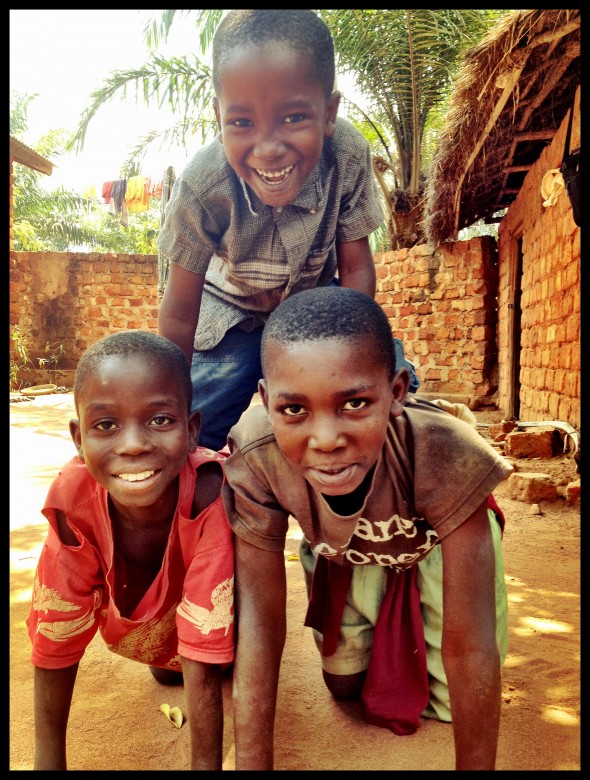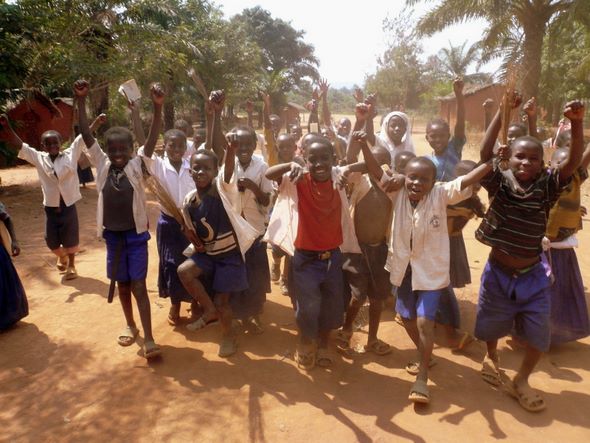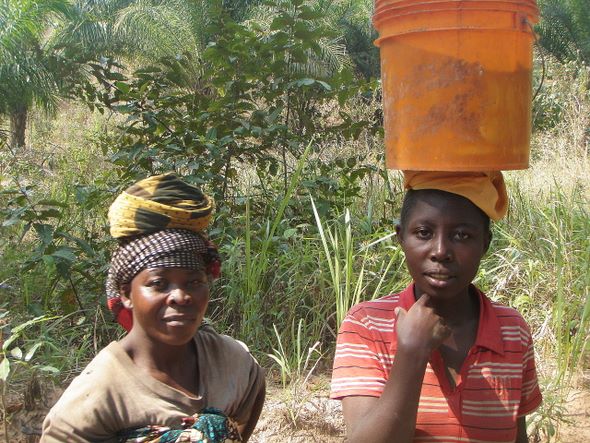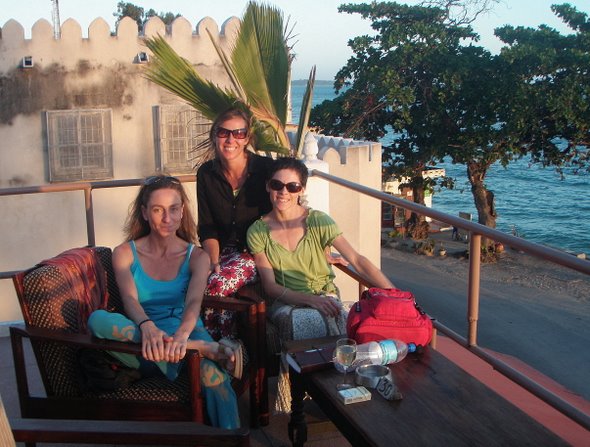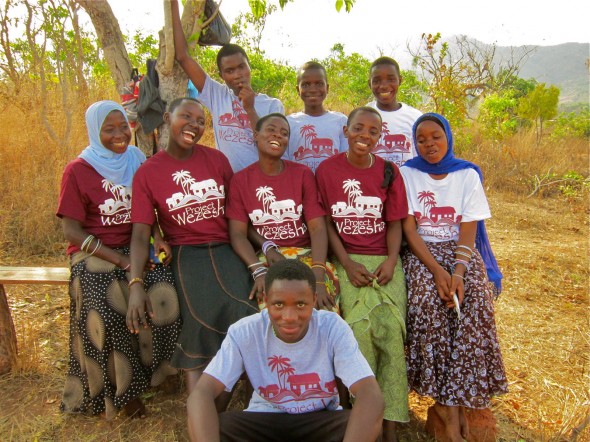 Project Wezesha has two primary programs – the construction of Amahoro Secondary School and the scholarship program for secondary school students. We currently support 13 students who are going to one of three secondary schools in the region – Mugonya, Mwandiga and Kagongo. On Saturday, we arranged to meet with the students to sit, chat, catch up and see if they had any requests or views to share. (“Share Views” is one of Lucas’ favorite phrases.) The ones who were able to make it were: the girls – Hindu, Silvesia, Edina, Diana, Khadija and the boys – Amosi, Ismael, France and Saidi. We didn’t get to meet with Judith, Abuyu, Dibeit or Zainabu.
Project Wezesha has two primary programs – the construction of Amahoro Secondary School and the scholarship program for secondary school students. We currently support 13 students who are going to one of three secondary schools in the region – Mugonya, Mwandiga and Kagongo. On Saturday, we arranged to meet with the students to sit, chat, catch up and see if they had any requests or views to share. (“Share Views” is one of Lucas’ favorite phrases.) The ones who were able to make it were: the girls – Hindu, Silvesia, Edina, Diana, Khadija and the boys – Amosi, Ismael, France and Saidi. We didn’t get to meet with Judith, Abuyu, Dibeit or Zainabu.
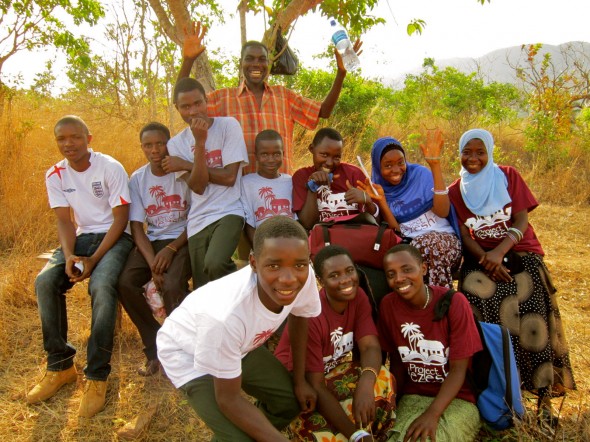
We all greeted one another, shared hugs and handshakes and then gifts. I brought them each a Project Wezesha t-shirt, made and donated by my hometown friend, Richard Knott with his company Native Sons. They loved the shirts! Then, Lucas chatted with them a bit about their final exams and gave a couple of his little mini-lectures to see if they were prepared. Four of our students – Hindu, Edina, Silvesia and Khadija – will graduate from secondary school on September 15th! Then, on October 3rd, they will take their final examinations to see if they qualify to go to high school. I have to say – given the stats that Hindu and Saidi shared the other day, I’m not very hopeful. They all go to that secondary school that only passed 7 of 200 students last year. But, I’ll ‘share my views’ about a solution suggested by the students. First, let me introduce them.
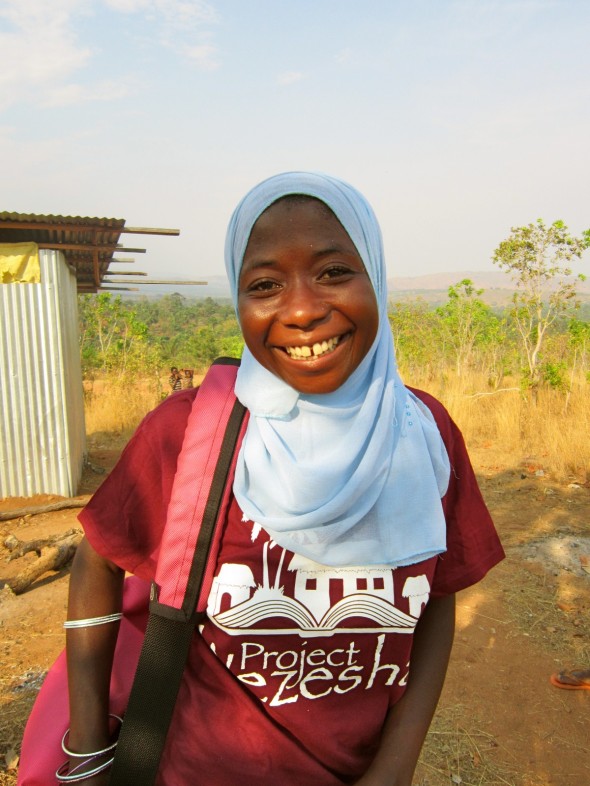 Hindu is my long time friend and dada mdogo. I met Hindu when I was a guest at GOSESO in 2008. She lives at the top of the driveway for the guest house I stayed in. For longtime followers of my story with this community, it was Hindu who lost her father only weeks after I left the second year. It was also her sister who had the big village wedding that I attended in 2009. Hindu was shy to warm up to me initially, but then she was relentless with her questions and her desire to know more and more and more about me, America and English. She was an obvious first choice when I began brainstorming with Lucas about supporting some youngsters in secondary school. Now, every year I return, it’s definitely like visiting my little sister. We hold hands, hug, say each other’s name at random throughout the day – “Hindu …. Mambo” …. “Rai …. Mambo”. After one of our recent visits, Hindu measured my whole body for a skirt and blouse that she is making for me. I didn’t even know she could sew and she already called Lucas to tell us it’s ready. I’m excited to see what she can do! Hindu, after 4 years at Mwandiga Secondary School, is graduating next week! I’m so excited for her, but it doesn’t stop here. (stay tuned)
Hindu is my long time friend and dada mdogo. I met Hindu when I was a guest at GOSESO in 2008. She lives at the top of the driveway for the guest house I stayed in. For longtime followers of my story with this community, it was Hindu who lost her father only weeks after I left the second year. It was also her sister who had the big village wedding that I attended in 2009. Hindu was shy to warm up to me initially, but then she was relentless with her questions and her desire to know more and more and more about me, America and English. She was an obvious first choice when I began brainstorming with Lucas about supporting some youngsters in secondary school. Now, every year I return, it’s definitely like visiting my little sister. We hold hands, hug, say each other’s name at random throughout the day – “Hindu …. Mambo” …. “Rai …. Mambo”. After one of our recent visits, Hindu measured my whole body for a skirt and blouse that she is making for me. I didn’t even know she could sew and she already called Lucas to tell us it’s ready. I’m excited to see what she can do! Hindu, after 4 years at Mwandiga Secondary School, is graduating next week! I’m so excited for her, but it doesn’t stop here. (stay tuned)
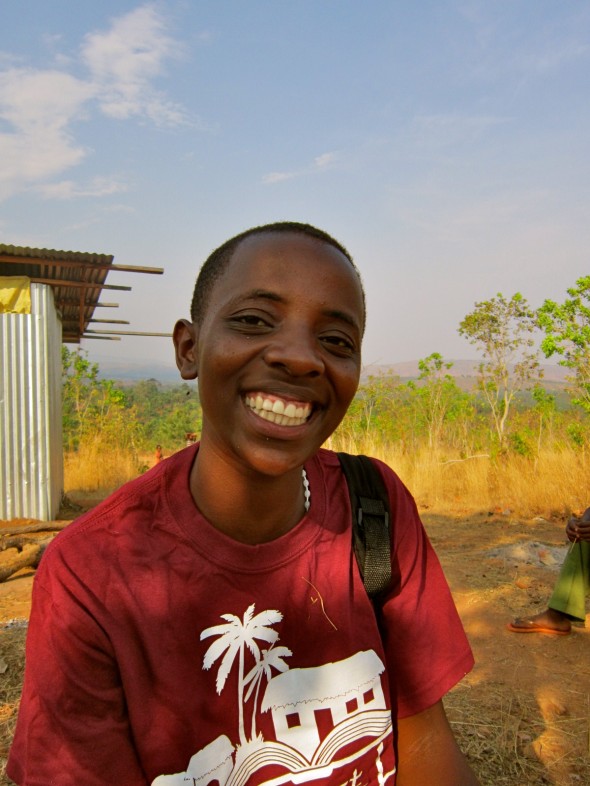 Edina is also a Form 4 student graduating from Mwandiga Secondary next week. I met Edina when Lucas helped to select her for our first round of students to support in secondary school, back in 2008. She comes from a single parent home – her mother passed away some time ago and her father and aunt raise her. She is so bright and has a smile to die for! As is the case with most girls, her English isn’t great – they are usually so shy to speak in class when they are one of 6-10 girls in a class of up to 90 students. Imagine! Having played on a boys’ golf team in high school, I know what that feels like – going through puberty with nothing but boys around … talk about nerves! But, Edina has some hopes. She wants to go on and learn about computers when she finishes secondary school. I don’t think she, or the other girls to be honest, have high expectations about the final exams and therefore high school, but their educational dreams don’t end with graduation next week.
Edina is also a Form 4 student graduating from Mwandiga Secondary next week. I met Edina when Lucas helped to select her for our first round of students to support in secondary school, back in 2008. She comes from a single parent home – her mother passed away some time ago and her father and aunt raise her. She is so bright and has a smile to die for! As is the case with most girls, her English isn’t great – they are usually so shy to speak in class when they are one of 6-10 girls in a class of up to 90 students. Imagine! Having played on a boys’ golf team in high school, I know what that feels like – going through puberty with nothing but boys around … talk about nerves! But, Edina has some hopes. She wants to go on and learn about computers when she finishes secondary school. I don’t think she, or the other girls to be honest, have high expectations about the final exams and therefore high school, but their educational dreams don’t end with graduation next week.
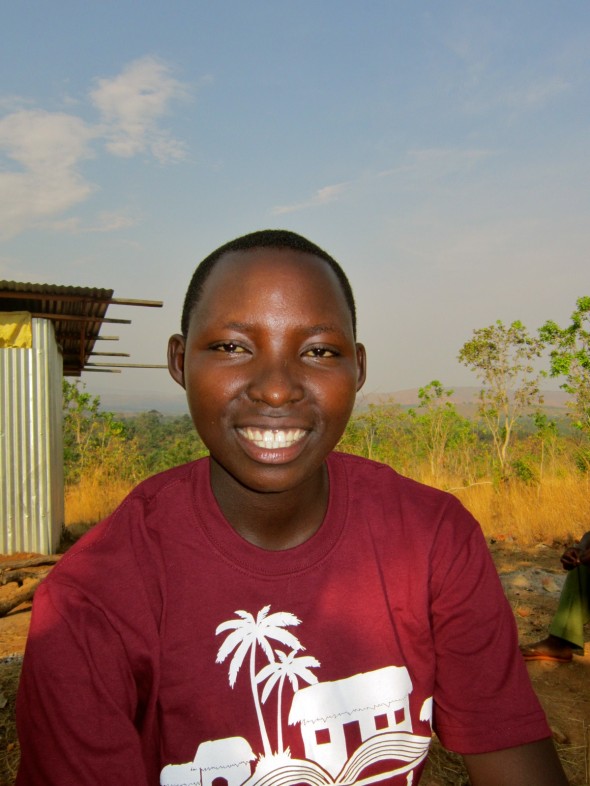 Diana is so tall and strong! She has the posture of a dancer and so much strength in her character. She greeted me with a huge hug and told me how much she had missed me, even though we’ve only met briefly on two separate occasions since 2008. She was beaming on this day together – and walked with me all the way back to Kiganza, asking about my family, my home, my language, etc. She told me she hopes to be a nurse so she wants to do well in her examinations so she can continue her studies. Diana is also from a single parent family and was also chosen back in 2008 with the help of Lucas, who investigated the brightest ‘vulnerable’ children in the village of Kiganza. Diana is a Form 3 student, so she still has another year of studies before graduating. She also attends a different school – Kagongo Secondary School.
Diana is so tall and strong! She has the posture of a dancer and so much strength in her character. She greeted me with a huge hug and told me how much she had missed me, even though we’ve only met briefly on two separate occasions since 2008. She was beaming on this day together – and walked with me all the way back to Kiganza, asking about my family, my home, my language, etc. She told me she hopes to be a nurse so she wants to do well in her examinations so she can continue her studies. Diana is also from a single parent family and was also chosen back in 2008 with the help of Lucas, who investigated the brightest ‘vulnerable’ children in the village of Kiganza. Diana is a Form 3 student, so she still has another year of studies before graduating. She also attends a different school – Kagongo Secondary School.
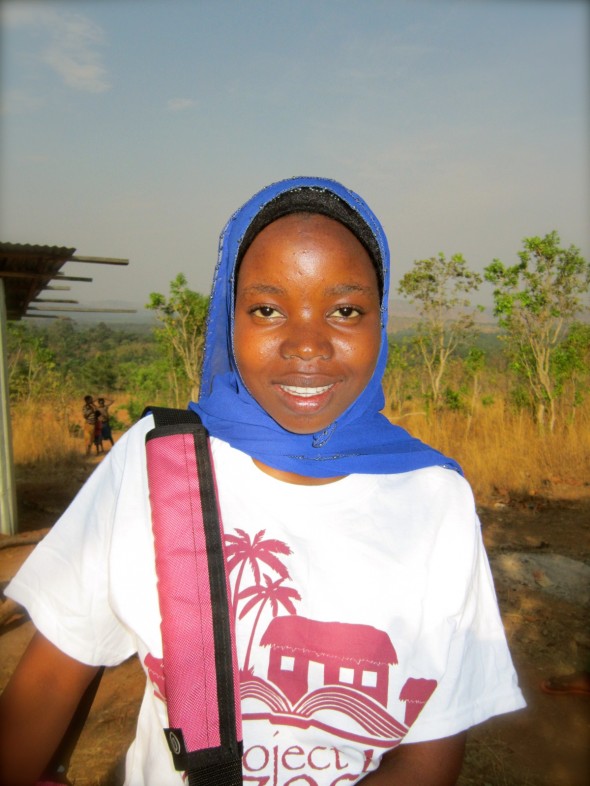 Khadija has one of the most delightful smiles I have ever seen. She has great cheeks and dimples and if you don’t see her smile, you might be intimidated by her seriousness – but once you crack the shell, she shines! She, too, is a little bit shy – though not as much as Edina. She likes to hold hands, ask questions and learn about all types of things. She is graduation from Mwandiga Secondary next week. If she can’t go to high school, she wants to study electronics so that she do maintenance on equipment such as computers, radios, TVs.
Khadija has one of the most delightful smiles I have ever seen. She has great cheeks and dimples and if you don’t see her smile, you might be intimidated by her seriousness – but once you crack the shell, she shines! She, too, is a little bit shy – though not as much as Edina. She likes to hold hands, ask questions and learn about all types of things. She is graduation from Mwandiga Secondary next week. If she can’t go to high school, she wants to study electronics so that she do maintenance on equipment such as computers, radios, TVs.
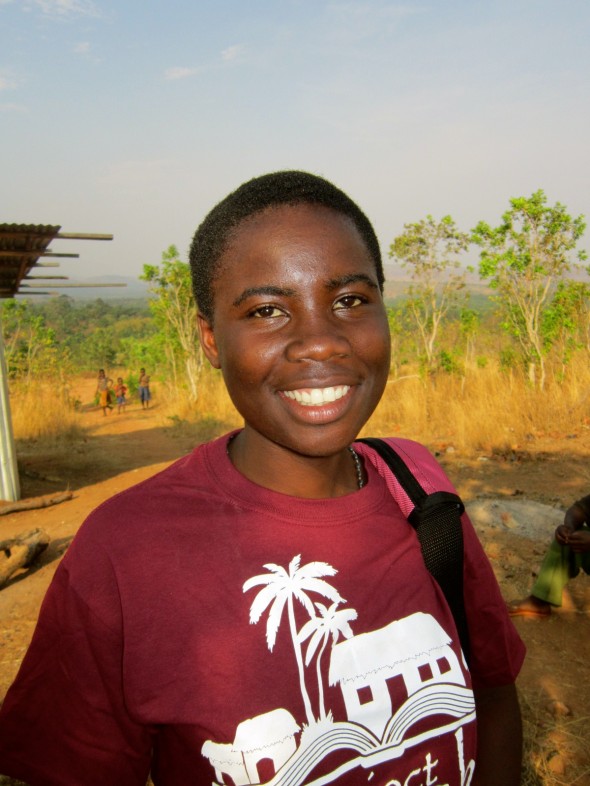 Silvesia is one of our students who is also graduating next week – but this year is the first time I have ever met her! So, I don’t know much about her except that she lives in Mgaraganza village and she is a firecracker. She warmed up to me instantly and was asking questions, making jokes, smiling easily and just wanting to know more and more. It was so great to finally meet her after knowing that we’ve been supporting her in school since 2009. After secondary school, she would either like to attend vocational school and learn more about computers or go on to high school if possible and become a nurse.
Silvesia is one of our students who is also graduating next week – but this year is the first time I have ever met her! So, I don’t know much about her except that she lives in Mgaraganza village and she is a firecracker. She warmed up to me instantly and was asking questions, making jokes, smiling easily and just wanting to know more and more. It was so great to finally meet her after knowing that we’ve been supporting her in school since 2009. After secondary school, she would either like to attend vocational school and learn more about computers or go on to high school if possible and become a nurse.
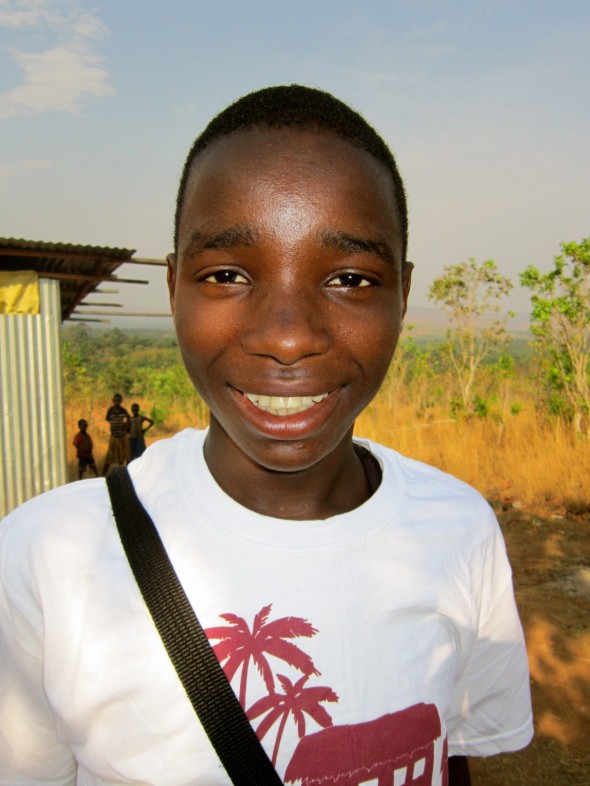 France is a very shy young boy. His English is a little sticky, but he tries – and he is super grateful for the support he’s received (as are they all). He is a Form 3 student at Mwandiga Secondary school. I have met France a time or two before, but he is always very shy and Luas and I usually spend more time talking to his mother and sister. His father passed away some time ago, so Lucas thought helping him and his older brother Ismael would be nice. They have been supported by Project Wezesha since 2008.
France is a very shy young boy. His English is a little sticky, but he tries – and he is super grateful for the support he’s received (as are they all). He is a Form 3 student at Mwandiga Secondary school. I have met France a time or two before, but he is always very shy and Luas and I usually spend more time talking to his mother and sister. His father passed away some time ago, so Lucas thought helping him and his older brother Ismael would be nice. They have been supported by Project Wezesha since 2008.
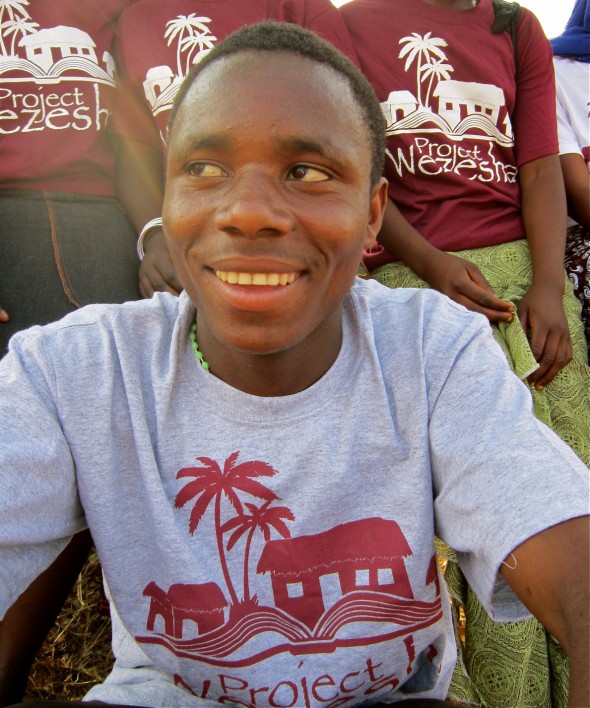 Ismael is more outgoing than his younger brother France. They are both studying in Form 3, but Ismael goes to Kagongo Secondary with Diana. Sometimes, exam scores after Primary School determine the school students go to within their region. I don’t know the details too well. Ismael is a super delightful young man. He’s very polite and inquisitive. He has a big dream of becoming a doctor one day – so I really hope he can pull it off by first passing his final exams next year and then succeeding in high school.
Ismael is more outgoing than his younger brother France. They are both studying in Form 3, but Ismael goes to Kagongo Secondary with Diana. Sometimes, exam scores after Primary School determine the school students go to within their region. I don’t know the details too well. Ismael is a super delightful young man. He’s very polite and inquisitive. He has a big dream of becoming a doctor one day – so I really hope he can pull it off by first passing his final exams next year and then succeeding in high school.
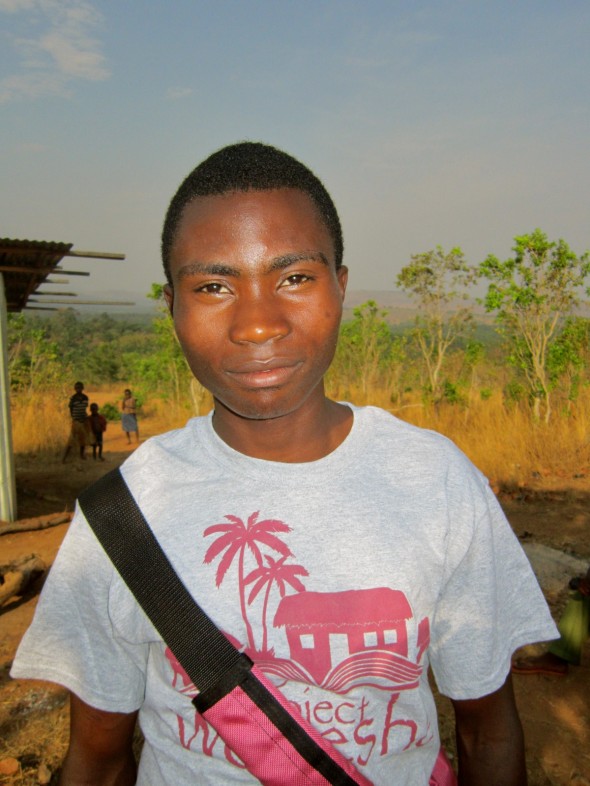 Amosi is hilarious! He seems almost gruff or angry when you first meet him but it’s because behind those eyes and under a slight frown, his mind is racing a mile a minute. When he stops thinking, relaxes and smiles – his whole face changes! When I asked him what he wanted to do after he was finished with all his studies, he told me he wanted to be the President of Tanzania! I believe, he might just get there one day – he has determination. He had many great suggestions for ways he thought Project Wezesha could better support the students – some a little out of our range/mission, such as buying students kerosene to study by light at night. I know it’s necessary, but there are some components to the children’s education that their parents have to invest in, too. This was also the first time I’ve met Amosi – it was great to put a face to a name.
Amosi is hilarious! He seems almost gruff or angry when you first meet him but it’s because behind those eyes and under a slight frown, his mind is racing a mile a minute. When he stops thinking, relaxes and smiles – his whole face changes! When I asked him what he wanted to do after he was finished with all his studies, he told me he wanted to be the President of Tanzania! I believe, he might just get there one day – he has determination. He had many great suggestions for ways he thought Project Wezesha could better support the students – some a little out of our range/mission, such as buying students kerosene to study by light at night. I know it’s necessary, but there are some components to the children’s education that their parents have to invest in, too. This was also the first time I’ve met Amosi – it was great to put a face to a name.
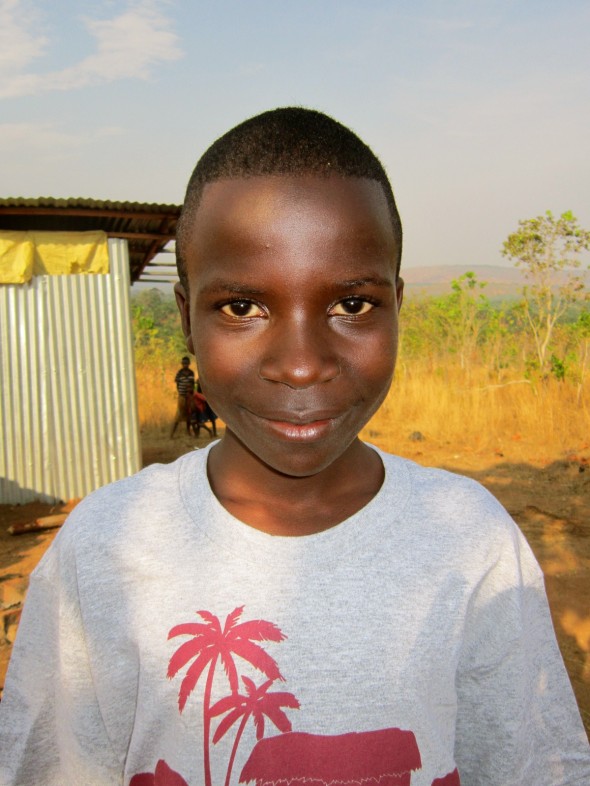 Saidi, like Hindu, almost needs no introduction. Saidi and his good friend Dibeit* used to come over and sit with me daily when I was in Kiganza the first time in 2008. They always came with notebook in hand and would ask if they could copy from my English/Swahili dictionary because they didn’t have one. By the end of that trip, I just gave them each a dictionary because they were so determined. They always came with questions, ideas, enthusiasm and something just sparkled in both of them. *Dibeit is also in our scholarship program, but he studies in a school in Dodoma, another city in the middle of the country where he has some family. Saidi’s house is usually the hub for our visits. When I come to Kiganza, we meet at Saidi’s house and the other kids in the village that we know (Hindu, Clemensia, Dibeit, etc.) come to his house to visit. This is also where they set up shop for the English books (little library) that we compiled on a visit in 2009. Also, it was Saidi’s grandfather (Babu) that we spent a lot of time trying to help last year (with his weepy eyes, which are better this year). Saidi – well … he’s going to go somewhere if Project Wezesha has anything to say about it. J Not only does he have smarts, but he has integrity and a strong moral sense about him. He’s just ‘good people’, ya know! So, Saidi and Dibeit are Form 1 students. Saidi goes to Mugonya Secondary school which is in Kiganza village. According to Saidi, it’s a little grim – teachers not always showing up, 60+ students per class and no books. It’s still so early for Saidi and I think we may investigate either a better school or additional support outside of school – such as a tutor, and definitely books.
Saidi, like Hindu, almost needs no introduction. Saidi and his good friend Dibeit* used to come over and sit with me daily when I was in Kiganza the first time in 2008. They always came with notebook in hand and would ask if they could copy from my English/Swahili dictionary because they didn’t have one. By the end of that trip, I just gave them each a dictionary because they were so determined. They always came with questions, ideas, enthusiasm and something just sparkled in both of them. *Dibeit is also in our scholarship program, but he studies in a school in Dodoma, another city in the middle of the country where he has some family. Saidi’s house is usually the hub for our visits. When I come to Kiganza, we meet at Saidi’s house and the other kids in the village that we know (Hindu, Clemensia, Dibeit, etc.) come to his house to visit. This is also where they set up shop for the English books (little library) that we compiled on a visit in 2009. Also, it was Saidi’s grandfather (Babu) that we spent a lot of time trying to help last year (with his weepy eyes, which are better this year). Saidi – well … he’s going to go somewhere if Project Wezesha has anything to say about it. J Not only does he have smarts, but he has integrity and a strong moral sense about him. He’s just ‘good people’, ya know! So, Saidi and Dibeit are Form 1 students. Saidi goes to Mugonya Secondary school which is in Kiganza village. According to Saidi, it’s a little grim – teachers not always showing up, 60+ students per class and no books. It’s still so early for Saidi and I think we may investigate either a better school or additional support outside of school – such as a tutor, and definitely books.
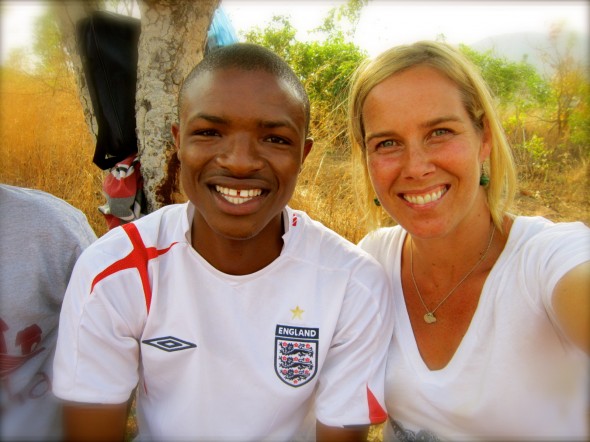 Our young friend Asheley was with us, too. I supported Asheley briefly to go to a supplementary school because his final examinations from secondary school weren’t good enough for him to go to high school. However, the teachers at this school – called Brothers of Charity – were flippant and only came to teach when they felt like it. So Asheley invested his school fees into a business and now has saved over 250,000Tsh in the bank. He rotates profits and purchases and in this way, he supports his mother and his younger siblings. On Saturday, he just wanted to come along and see the progress on the school as he helped carry some stones and sand with us last year.
Our young friend Asheley was with us, too. I supported Asheley briefly to go to a supplementary school because his final examinations from secondary school weren’t good enough for him to go to high school. However, the teachers at this school – called Brothers of Charity – were flippant and only came to teach when they felt like it. So Asheley invested his school fees into a business and now has saved over 250,000Tsh in the bank. He rotates profits and purchases and in this way, he supports his mother and his younger siblings. On Saturday, he just wanted to come along and see the progress on the school as he helped carry some stones and sand with us last year.
So – moving forward and considering the situation with the teachers, we’ve decided to buy textbooks to support the students outside of school. For each secondary school, we’re buying one set of books for each subject (Chemistry, Physics, Mathematics) for our scholarship program students to share in study circles.
In terms of the girls who are graduating this coming week, we have to wait until the end of October to find out if they will pass their secondary school exit exams and be accepted into high school. I am crossing my fingers that they will pass, but as I mentioned before – it’s not looking so good. So, Hindu and Edina made a suggestion/request that Project Wezesha continue to support them after secondary school as they attend VETA – which stands for Vocational Education and Training Authority.
Today, Lucas and I visited VETA to see what the situation is. They have short courses (1 week to 1 month long) on computers and driving. These courses (addressing topics such as Intro to Computer, Microsoft Word, Internet and Email, Basic Driving, etc.) cost anywhere from 20,000Tsh to 100,000Tsh depending on length and intensity ($15-$80USD). They also have long courses that last about one year in many vocational areas, including welding, electrical installation, carpentry, food production, information and communication technology, computer and secretarial studies, electronics, tailoring, etc. There are two options for the year-long courses – attend as day students or board on campus. For our students, given the fact that VETA is close to Kigoma town and they live in the villages, the best option is to board on site while studying and go home on the weekends. The cost is 120,000Tsh per year (~$100USD).
After considering the alternative (end of education all together), we’ve decided to continue supporting these four girls and not take any new students into the program until we see how this VETA experience is going and if there will be enough funding for additional students. If they pass their exams, we’ll support them in high school. If they don’t pass their exams, we’ll find a way to board them at VETA for the long course of their choice. We’re thinking of finding individual benefactors to support each of the four girls – so for those of you who wanted to support one individual specifically – this will be your chance!! I’ll keep you posted as exam results unfold.
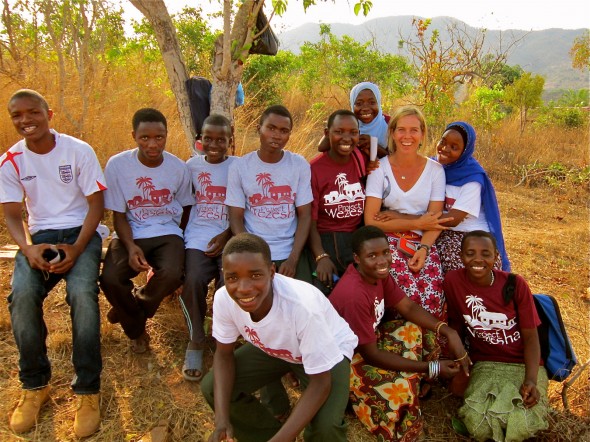 Finally, it’s a little bit of a gamble, but I’m thinking about changing my return ticket to Dar es Salaam by two days so that I can stay for the graduation. I didn’t realize how close it was and currently I’m scheduled to return to Dar the day before!! So, for no charge I can change my ticket, but it means flying back to Dar the day before my flight to Amsterdam … which is the gamble part. Precision Air swore the flights would go and there would be no problem. I think it’s worth the risk to see the girls walk with their class and celebrate successful completion of secondary school! Wahoo!!
Finally, it’s a little bit of a gamble, but I’m thinking about changing my return ticket to Dar es Salaam by two days so that I can stay for the graduation. I didn’t realize how close it was and currently I’m scheduled to return to Dar the day before!! So, for no charge I can change my ticket, but it means flying back to Dar the day before my flight to Amsterdam … which is the gamble part. Precision Air swore the flights would go and there would be no problem. I think it’s worth the risk to see the girls walk with their class and celebrate successful completion of secondary school! Wahoo!!
